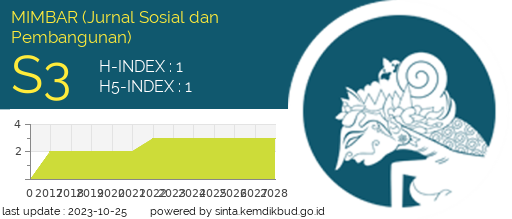Development of Urban Farming as a Strategy to Support Food Security
DOI:
https://doi.org/10.29313/mimbar.v39i1.2099Keywords:
Food Security, Public Policy, Urban FarmingAbstract
Food security is a global strategic issue, affecting social and economic stability and even national security. Indonesia's population is increasing sharply, food security needs to be strengthened through urban farming. The source of food production in urban areas has decreased, due to the narrowing of agricultural land. The research method is descriptive and qualitative. Data collection was done using interview, observation and documentation techniques. The research analysis uses the model by Miles Huberman. The results of the study indicate that the community already understands and is familiar with urban farming with P2L, even groups of PKK women have participated in plant management in their yards; the inhibiting factors of the perpetrators are not understanding the technicalities of urban farming, lack of capital and the existence of extreme weather; The local government strongly supports the making of food security policies through urban farming by issuing several legal products of Regional Regulations.
References
Al-Kodmany, K. (2018). The vertical farm: A review of developments and implications for the vertical city. In Buildings. https://doi.org/10.3390/buildings8020024
Aryanti, Z., Iskandar, Tb. Z., Agustiani, H., & Cahyadi, S. (2021). Strengthening Adolescent’s Entrepreneurial Behavior through Social Support. MIMBAR : Jurnal Sosial Dan Pembangunan, 37(1). https://doi.org/10.29313/mimbar.v37i1.6415
Badan Ketahanan Pangan. (2019). Indeks Ketahanan Pangan Indonesia 2019 (Food Security Index of Indonesia 2019). Food Security Bureau, Republic of Indonesia.
Bendt, P., Barthel, S., & Colding, J. (2013). Civic greening and environmental learning in public-access community gardens in Berlin. Landsc Urban Plan, 109(1), 18–30.
Gultom, F., & Harianto, S. (2022). LUNTURNYA SEKTOR PERTANIAN DI PERKOTAAN. Jurnal Analisa Sosiologi. https://doi.org/10.20961/jas.v11i1.56324
Hapsari, N. I., & Rudiarto, I. (2017). Faktor-Faktor yang Mempengaruhi Kerawanan dan Ketahanan Pangan dan Implikasi Kebijakannya di Kabupaten Rembang. Jurnal Wilayah Dan Lingkungan. https://doi.org/10.14710/jwl.5.2.125-140
Junainah, W., Kanto, S., & Soenyono. (2016). Program Urban Farming sebagai Model Penanggulangan Kemiskinan Masyarakat Perkotaan (Studi Kasus di Kelompok Tani Kelurahan Keputih Kecamatan SUkolilo Kota Surabaya). Wacana.
Koestedjo, E. H. (2018). STRATEGI PENANGGULANGAN KEMISKINAN DAERAH KABUPATEN GRESIK TAHUN 2017. Jurnal Ilmiah Sosio Agribis. https://doi.org/10.30742/jisa.v18i1.445
Kustanto, M., & Sholihah, F. (2020). Reserve Brain Drain sebagai Alternatif Mengatasi Kemiskinan. Jurnal Litbang: Media Informasi Penelitian, Pengembangan Dan IPTEK. https://doi.org/10.33658/jl.v16i1.164
Mabon, L., Shih, W.-Y., & Jou, S.-C. (2022). Integration of knowledge systems in urban farming initiatives: Insight from Taipei Garden City. Sustainability Science. https://doi.org/10.1007/s11625-022-01196-x
Miles, M. B., Huberman, M., & Saldana, J. (2014). Qualitative Data Analysis (3rd ed.). SAGE Pubkications.
Mima Kurniasih. (2015). Implementasi Program Urban Farming Sebagai Strategi Pembangunan Ketahanan Pangan Perkotaan (Studi Di Kelurahan Made, Kecamatan Sambikerep, Kota Surabaya). Jurnal Administrasi Publik.
Nainggolan, K. (2011). Persoalan pangan global dan dampaknya terhadap ketahanan pangan nasional. Pangan.
Omondi, S. O., Oluoch-Kosura, W., & Jirström, M. (2017). The role of urban-based agriculture on food security: Kenyan case studies. Geographical Research. https://doi.org/10.1111/1745-5871.12234
Parsudi, S. (2019). MODEL, MOTIVASI DAN KENDALA MASYARAKAT DALAM MELAKUKAN PERTANIAN KOTA (URBAN FARMING) DI KOTA SURABAYA. Berkala Ilmiah AGRIDEVINA. https://doi.org/10.33005/adv.v8i1.1612
Qowiyyum, E. B., Nailatul Wardah, O. A., & Dkk. (2020). Implementasi Program Urban Farming Dinas Ketahanan Pangan Dan Pertanian Kota Surabaya. Researchgate.
Rahmadani, D. Z., Kamil, M., & Salahudin, S. (2021). Community Empowerment in Improving the Quality of Slums: A Structured Literature Review. MIMBAR : Jurnal Sosial Dan Pembangunan, 37(2). https://doi.org/10.29313/mimbar.v37i2.8072
Sadali, M. I. (2018). Ketahanan Pangan Berkelanjutan di Kabupaten Sukoharjo. JURNAL GEOGRAFI. https://doi.org/10.24114/jg.v10i1.8493
Septya, F., Rosnita, R., Yulida, R., & Andriani, Y. (2022). URBAN FARMING SEBAGAI UPAYA KETAHANAN PANGAN KELUARGA DI KELURAHAN LABUH BARU TIMUR KOTA PEKANBARU. RESWARA: Jurnal Pengabdian Kepada Masyarakat. https://doi.org/10.46576/rjpkm.v3i1.1552
Sisodia, G. S., Alshamsi, R., & Sergi, B. S. (2021). Business valuation strategy for new hydroponic farm development – a proposal towards sustainable agriculture development in United Arab Emirates. British Food Journal. https://doi.org/10.1108/BFJ-06-2020-0557
Supriyati, S. (2021). ANALISIS MOTIVASI PEMANFAATAN PEKARANGAN UNTUK PERTANIAN PERKOTAAN DI KABUPATEN BUNGO. JAS (Jurnal Agri Sains). https://doi.org/10.36355/jas.v5i1.543
Tidball, K., & Krasny, M. (2011). Toward an ecology of environmental education and learning. Ecosphere, 2(2), art21.
Zezza, A., & Tasciotti, L. (2010). Urban agriculture, poverty, and food security: Empirical evidence from a sample of developing countries. Food Policy. https://doi.org/10.1016/j.foodpol.2010.04.007.














